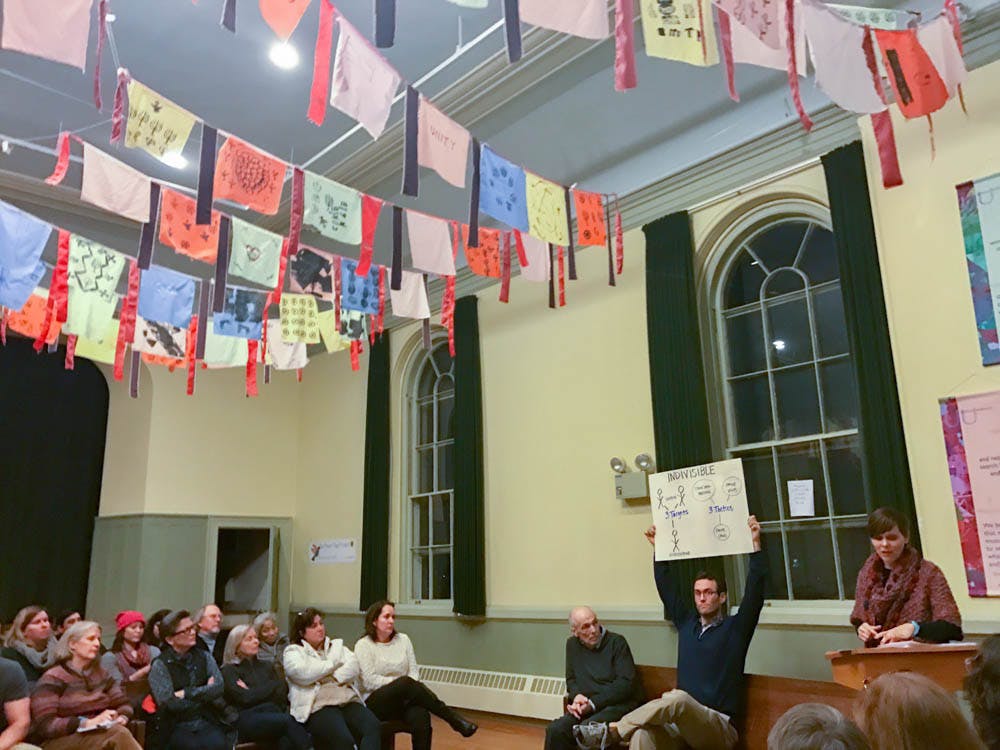In 2009, the inauguration of former President Barack Obama provoked the creation of the conservative Tea Party movement as a vehicle of organized resistance. In the wake of President Trump’s electoral victory, progressives across the country are seeking to create something of a new Tea Party in the grassroot movement known as Indivisible. Its mission is simple— stop the Trump agenda.
Former congressional staffers wrote the Indivisible guide — the movement’s written platform — using Tea Party strategies to resist Trump, said Andy Acciaioli, founder of Indivisible RI. By Jan. 4, only weeks after the election, the national movement had grown to 350 constituent groups, he added. Currently, Indivisible comprises over 7,000 groups nationwide.
In its five weeks of existence, Indivisible RI already has five groups in the state and an estimated 3,700 “supporters,” Acciaioli said.
“We don’t get involved in issues — though there are many that we hold near and dear to our hearts. The most important thing is to stop the Trump agenda,” Acciaioli said.
The success of the Tea Party movement demonstrated the power of constituent influence on congressmen, Acciaioli said, stressing the significance of community interaction in the Ocean state. He added that the same zeal that propelled the Tea Party to prominence in 2009 will be repurposed to resist the Trump administration. Resistance takes two key forms: making daily calls to senators and visiting local offices, he added.
Indivisible RI hosted an information event Feb. 16 where dozens of activists, students and residents joined to voice their frustration and concern.
Invoking the years of the Bush administration, audience member Philip Graham said Democrats should abstain from cooperating with the Trump agenda. “My worry is that we make sure there are no Democratic votes, no fingerprints on any of the terrible stuff that’s coming.”
Organizers encouraged members to make phone calls, visit congressmen’s offices and press elected officials at town hall meetings. At one point in the meeting, they incorporated role-playing and practiced phone calls to prepare audience members.
Jane Tucker, an organizer of Indivisible RI, said the organization should focus on holding Democratic leaders accountable, even in a majority blue state like Rhode Island.
“Some people say to me, ‘But our members of congress are Democrats, they’re on our side,’” Tucker said. But he noted that recent votes in cabinet confirmation hearings prove the opposite. Sen. Jack Reed D-R.I. and Sen. Sheldon Whitehouse D-R.I. both voted to confirm Trump’s Director of Central Intelligence Agency nominee, Mike Pompeo, for example.
Congressmen are more likely to notice acts that take up constituents’ time, Tucker said. Though small-scale actions such as petitions are effective, Tucker said, they do not compare to the impact of an office visit. “For every call, there are 10 people not calling. My showing up counts for 100 people,” said one audience member.
“In a state like ours, our actions are to embolden our members of Congress, to (make them) the advocates we want them to be,” Tucker said. “We want them to get out on the senate floor whenever they can. We want them loud, we want them angry.”
Tucker noted Indivisible RI’s influence on the congressmen given Sen. Whitehouse’s distinct change in behavior and actions over the last few months. After. Sen. Elizabeth Warren D-Ma was barred from speaking on the senate floor during the vote for attorney general nominee Sen. Jeff Sessions R-Al, Sen. Whitehouse attempted to enter Coretta Scott King’s letter into the congressional record. Though he failed, some Indivisible RI members felt encouraged by Whitehouse’s act.
“I see people come in with their heads down, they feel there is no hope,” Acciaioli said. “By the end of the meeting, they see the simplicity of the system and suddenly, that gives them hope.”





